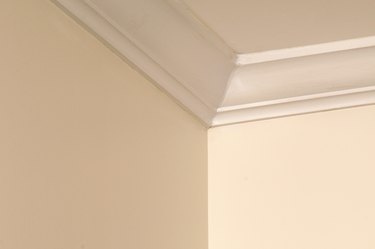Things You'll Need
Table saw
Steel ruler
4-foot long, 2-by-4 lumber
Push sticks

One issue with crown molding that plagues virtually every installation occurs when a nail won't reach the wood hidden behind the drywall. You can use a stud finder to look for a rafter, but on a wall that runs parallel to the rafters, you can't count on finding a rafter. A block installed behind the crown molding at the junction of the ceiling and wall and nailed to the wall framing provides a solid nailing surface for crown molding.
Step 1
Set the angle of a table saw blade by turning the blade angle handle until the indicator reaches 45 degrees. Raise the blade until the top of the blade is 1-3/4 inches above the table. Use a steel ruler to make the measurement.
Video of the Day
Step 2
Place the fence on the side of the blade so that the blade angles up toward the fence. Set the fence 1-3/4 inches from the point where the blade emerges from the saw table.
Step 3
Place a 4-foot length of 2-by-4 lumber face-down on the saw with one edge against the fence. Have push sticks within reach. The lumber should not touch the blade.
Step 4
Turn the table saw on. Hold the 2-by-4 against the fence and guide it into the blade. Use steady, even pressure to guide the 2-by-4 through the blade. As you near the end of the lumber piece, use the push sticks to hold the 2-by-4 against the fence then continue to push it through and completely past the blade. This rip-cuts the lumber in half at a 45-degree angle.
Step 5
Place the uncut edges of the backer block at the junction of the ceiling and wall. Drive 3-inch drywall screws through the block and into the horizontal board that rests just behind the drywall at the top of the wall. Use one screw for every 12 inches of blocking.
Tip
Key places to place the block backing include within 3 inches of corners and wherever two pieces of crown molding meet in the middle of a wall. When you install the crown molding, nail it directly to the block backing.
Warning
Never rip-cut on a table saw with the blade angled up and away from the fence. The cut-off piece may rocket back and strike you or a bystander.
Use a small piece of painter's tape on the wall 6 inches below the block to mark each screw to ensure you don't accidentally hit the screw with a nail.
Video of the Day